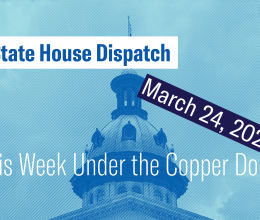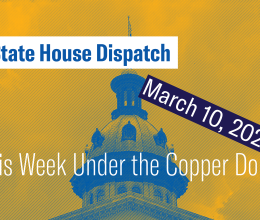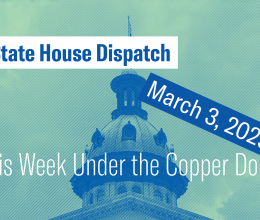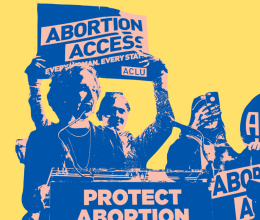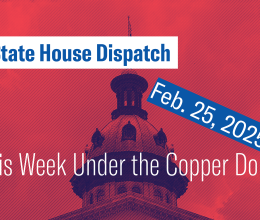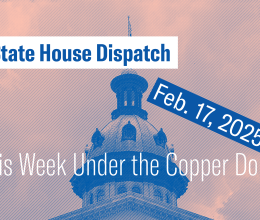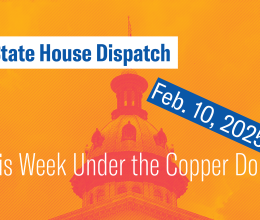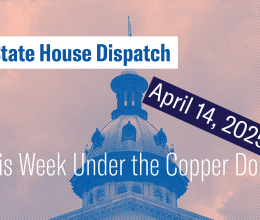
Three legislative weeks remain before May 8, when the South Carolina General Assembly will adjourn for the calendar year. Any bills not passed before then will carry over into the second half of 2025-2026 legislative session beginning in January 2026.
This week the Senate will be busy with budget negotiations. We’ll be on the lookout for any provisos (one-year laws attached to the state budget) that seek to introduce harmful policies via the budgeting process.
A police surveillance expansion bill
A bill introduced in the Senate, S. 447, would allow law enforcement agencies to install automated license plate readers (ALPRs) along state-owned highways. These devices, which can photograph and log thousands of license plates per minute, often pool information about drivers’ whereabouts into regional sharing systems.
ACLU-SC Advocacy Director Josh Malkin spoke at a subcommittee hearing on S. 447 last week, raising concerns including the possibility that these cameras could surveil people on private property. The bill was carried over, meaning it did not receive a vote. It remains in the Senate Judiciary Committee.
Any form of mass surveillance brings the potential for abuse and can be used to restrict civil liberties. According to one lawsuit filed in South Carolina in 2023, at least 99 agencies and more than 2,000 individuals had access to a searchable database containing millions of images gathered by ALPRs. For more information about these devices and the policies regulating their use, see the ACLU page on ALPRs.
Second Chance Day at the State House
As a reminder, the South Carolina Justice Partners Coalition will hold a Second Chance Day in the State House lobby this Thursday, April 24, from 10 a.m. to 3 p.m. Formerly incarcerated folks will join allies in the lobby to raise their concerns with lawmakers. Visit the link below to read more information and RSVP if you would like to attend in solidarity.
RSVP FOR SECOND CHANCE DAY (4/24)
One bill that we and coalition partners will be supporting is H. 3655, which would make several positive changes to South Carolina’s juvenile justice system. This bill would prevent children from being detained in Department of Juvenile Justice facilities for status offenses such as truancy or incorrigibility, which are only illegal because of their age. It would also end the practice of placing juveniles in “secure confinement” in adult jails for more than six hours. More information is available on our bill page for H. 3655.
Proselytization in public schools
House Bill 3758 would allow students to deliver religious messages at forums including graduation ceremonies, morning announcements, assemblies, and the start of athletic events. The House Education and Public Works Committee will meet to discuss this and other bills on Wednesday, April 23, at 9 a.m. in Room 433 of the Blatt Building (1105 Pendleton St., Columbia). The agenda is here. A video livestream will be available.
As a reminder, public school students already have the right to pray and read religious literature during free time at school, to participate in before- and after-school religious events and student religious clubs, and even hand out religious literature to their classmates. This bill fits into a broader Christian nationalist project aimed at subjecting students to prayer and proselytizing during official school events, as exemplified in cases like Kennedy v. Bremerton School District.
The bill also has a South Carolina-specific angle to it: Both of its sponsors represent Chesterfield County, where a parent had to sue the school district in 2011 to challenge the constitutionality of an in-school worship rally. That case, Anderson v. Chesterfield County School District, ended in January 2012 with a federal consent decree to protect students’ rights under the First Amendment Establishment Clause.
Public funds for private schools
Last week state lawmakers took another step toward publicly subsidizing private K-12 schools, including religious institutions and schools that deny admission to LGBTQ students. The South Carolina Daily Gazette has the fiscal details and an explanation of the rushed process to pass S. 62, but the big picture is that lawmakers are tweaking an existing voucher program in an attempt to get it past the State Supreme Court, which rejected that program as unconstitutional last year.
The South Carolina Education Association has a page with more information about the status of this bill, the financial impact it would have in your local school district, and a message page to help you contact your state lawmakers.
If you’re looking for a video to highlight the risks of this bill to your friends, our team recently put together a video (on Instagram and Facebook) highlighting the student codes of conduct at private schools that would be eligible for vouchers under this bill.
Parole for women who are pregnant and incarcerated
One positive bill introduced this session, S. 385, seeks to improve health outcomes for women who are pregnant at the time of their incarceration.
Under this bill, which was referred to the Senate Corrections and Penology Committee in February, state prisons and local detention facilities would offer pregnancy tests at intake medical screenings. If a person tests positive for pregnancy, courts would be required to release that person on bail if it determines she does not pose a significant threat to herself or others.
This bill has not received a committee hearing yet. One way you can help advance a bill is by contacting your members of the state House and Senate to asking them to cosponsor the bill. If you haven’t already, try using the Find Your Legislators tool at scstatehouse.gov to look up your lawmakers and their contact information.


